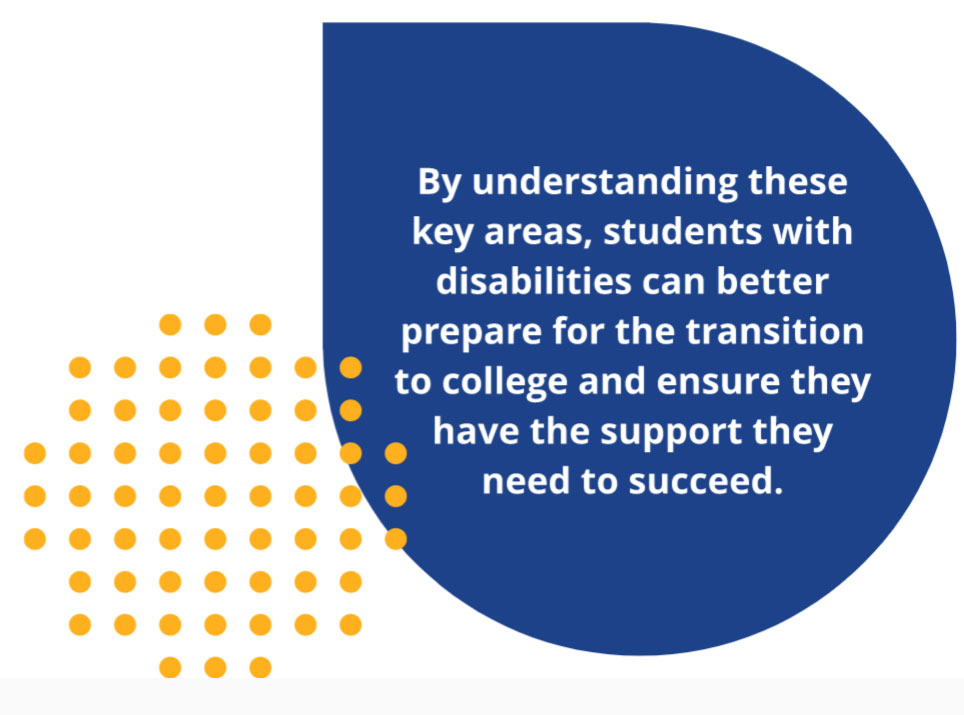High School to College: Steps for Success for Students with Disabilities
More than 20 percent of college students in the United States have a disability. Transitioning from high school to college is a significant step, especially for students with disabilities. Students with an IEP/504 plan in high school who plan to attend college need to understand the significant differences between high school and college disability services. Accommodations from a high school IEP/504 plan do not automatically transfer with the student to college. Under the American with Disabilities Act, students must advocate for their needs and accommodations in college and cannot have someone else do this for them. Understanding these differences is crucial for success. Here’s a guide to help students with disabilities navigate this transition.

Building a college list 
When creating a college list, students should:
Preparing for the college
transition 
To ensure a smooth transition, during high school students with disabilities should focus on:
Self-advocacy
Start participating actively in IEP/504 or transition meetings. Learn to communicate your needs effectively. Practice by meeting with your teachers at the beginning of the year to explain your accommodations and needs.
Self-awareness
Understand and be able to name your accommodations. Work with your IEP/504 coordinator and school counselor to identify which accommodations are and are not likely to be accepted by a college. Identify potential triggers that may lead to anxious or depressive symptoms and develop positive coping strategies.
Independence
Develop organizational strategies that do not rely on family or teachers.
What families should expect
Families of students with disabilities should be aware that most colleges will not talk directly to a student’s family member. Even if a student signs a waiver allowing the college to talk with their family member, the amount of information colleges will share is limited. Professors are unlikely to talk with a student’s family member, even with a waiver. Families are encouraged to support their students’ self-advocacy skills during high school to support this transition.

Paying for college 
Complete the FAFSA
File the FAFSA (Free Application for Federal Student Aid) each year from your senior year of high school through college graduation. By completing the FAFSA, you may be eligible for state and federal financial aid to help pay for college. You can learn more about the FAFSA and get free one-on-one completion support here.
Explore scholarships
Apply for State of Delaware Scholarships and explore our Delaware Scholarship Compendium, which has more than 300 scholarships for Delaware residents to help pay for college and trade/technical schools. Click here to explore scholarships for students with disabilities.
State of Delaware Scholarships >
Learn about funding your education
Learn more about financial aid and how it works here.

Preparing to move on campus
Before moving on campus, you should do the following:
- Ensure your medical documentation is up-to-date.
- Obtain a copy of your IEP/504 plan (if applicable).
- Connect with the Disability Services Office at the college.
- Set-up healthcare by obtaining referrals from physicians and therapists and identify new physicians, therapists, etc. Schedule appointments if possible.
- Create a plan for obtaining prescriptions.

Requesting
accommodations 
Upon acceptance, to request accommodations in college, you must do the following every term or semester:
- Contact your college’s Disability Services Office for an appointment to officially request accommodations. Use this guide to help prepare for this meeting.
- Provide proof of your disability – this documentation must be current and provide information on the specific nature or condition and functional limitations.
- Have a copy of your IEP/504 plan. (It is important to note that having an IEP/504 plan in high school is not required to qualify for accommodations in college.)
- Meet with a Disability Services Office representative to request accommodations. If it is determined that you qualify for accommodations, you will be given an accommodation letter (only valid for one term/semester).
- You must notify each professor of your eligibility for accommodations.
Learn more about the
Disability Services Offices
at Delaware colleges 

Differences between high school and college accommodations
Under the Americans with Disabilities Act, colleges do not have to provide certain categories of accommodations that students may have received in high school under the Individuals with Disabilities Act (IDEA) or Section 504 of the Rehabilitation Act. These categories include:

Accommodations that fundamentally alter programs: An example would be giving a student a multiple-choice test instead of an essay test. Colleges also do not have to make exceptions in their admissions requirements for students who were excused or waived from taking a high school course because of their disability (e.g., a student who did not have to take a foreign language).

Personal services: A college may provide personal assistant care for a student who needs assistance dressing or other personal care, but the college does not have to pay for the personal assistant care. Alternatively, the college may provide a student with a reader in the classroom, but is not required to provide readers for help during individual study time.

Accommodations that produce equal results: Accommodations do not have to produce identical levels of achievement. In high school, students may have had altered standards (e.g., writing a shorter paper than their peers, copies of professors’ notes, extra credit assignments, multiple test retakes, etc.). Colleges are unlikely to approve these types of accommodations.
Colleges with unique supports and programs for students with disabilities
University of Delaware
Its Career & Life Studies Certificate (CLSC) program is the only college program in Delaware designed specifically for people with intellectual disabilities.
UD also offers Spectrum Scholars, a program with a system of supports and career development opportunities for select undergraduate students with autism.
Delaware Technical Community College
DTCC has partnered with Delaware’s Division of Vocational Rehabilitation (DVR) to provide educational support for transition students enrolled in remedial programs at each of DTCC’s four campuses.
University of Massachusetts, Amherst
UMass offers students with disabilities free weekly, bi-monthly, or monthly learning specialist sessions.
CharlestonLIFE
It is a four-year, fully inclusive non-degree certificate program designed for students with mild intellectual and/or developmental disabilities.
The University of Arizona and McDaniel College
UA and MDC offer more intensive support programs for students with disabilities, such as weekly coaching, tutoring, and workshops. It is important to note that these programs may include additional fees and costs not included in the college’s net price.
The following colleges exclusively serve students with specific disabilities:
Beacon College and Landmark College
Students with learning disabilities, ADHD, and/or autism
Gallaudet University
Students who are deaf and hard of hearing.
Students and families that would like to explore more colleges that fit their needs can explore BigFuture’s College Search tool and read the K&W Guide to Colleges for Students with Learning Differences.




